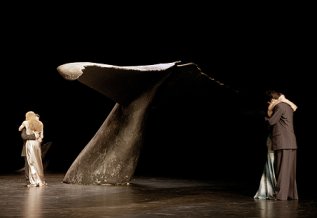
(reprinted with permission)
Late in choreographer Pina Bausch's "Ten Chi," Dominique Mercy stands upstage wearing a wine-red kimono. He waits, palms facing outward, his gaze fixed on the middle distance. A man unties Mercy's sash, then slips the red gown off with ceremonial calm. A white kimono is revealed. That robe is peeled away. Below it, Mercy wears a purple gown. That, too, is slipped off and beneath it is revealed a black kimono.
Finally, the black gown is removed. With a small shock, we discover veteran dancer Mercy wrapped in yards of tissue-thin, blood-red fabric. When that, too, is shed, Mercy stands before us, all but naked. Next, he slips into a Western-style shirt and long Western trousers and begins a haunting dance solo.
Vignettes like this, which seem to sum up Japan as a culture that poignantly dresses itself both in its own and a foreign culture's traditions, pack the evening-long dance theater work performed by Bausch's Tanztheater Wuppertal at Berkeley's Zellerbach Hall Friday night.
"Ten Chi," in fact, is an homage to a culturally layered, often magical and sybaritically surreal Japan, created by Germany's high priestess of dance theater with her dancers, who first performed it in 2004. It is among her recent lineup of savvy and unsentimental love letters to whole cultures.
As an island country, Japan lives off the sea, with fish and seaweed as central to the diet as milk is to the French. It makes exquisite sense that the central prop created by long-time Bausch decor wizard Peter Pabst is an outsized whale tail downstage left and, upstage, deep right, a protruding mound of whale torso. The mythic whale's vast form, like reality itself, is visible to us only in part.

As a canny metaphor, the whale fragments get at the sometimes buried, always layered nature of Japan's traditions and also do a pretty good job of summing up the giddy displacement of love, sex and intimacy. These potent forces seem to lurk beneath the dancers' feet, compelling, comic and sometimes monstrous.
Female longing erupts throughout. A character, for example, goes gaga over gorgeous vegetables. Another gets hot over a sizzling black shopping bag. Still another is titillated to the point of hysteria by protruding feet in an otherwise deserted movie theater. Women's fantasies and longing overwhelm moments as much as cleanliness, solitude and anxiety did in "Nur Du," Bausch's 1996 portrait of the United States. It is no wonder that Japan is a country of fans.
A second decor element, falling petals or snowflakes, does for our sense of time what the whale parts do for our grasp of space. From early on, we see a single petal fall. Then, later, another. By intermission, a blizzard of white descends on the unpopulated but still-visible stage space. Bausch lets theatrical time run even as the audience leaves the theater to use the bathroom.
It was not a perfect night. There were fallow scenes, and segues from one evocative music choice to another often lurched ineptly. But Bausch is never after perfection. She builds operatic renderings of life that finger the comic, the grotesque and the beautiful. "Ten Chi" had plenty of it all.
And for the lovers of sheer movement, the wild calligraphic dance solos that stocked the evening were a joy. They were full of the flexed feet of Noh, the lunges of martial arts, the robotic angles of video and the sinewy ripples of geisha dance. They also ranged from the virtuosic work of young dancers to less elastic but theatrically keen solos of the older performers.

It was a blizzard of such solos that brought the night to a stunning close. How apt it seemed that in a landscape so alive with petals/snow, everyone danced alone, yet no one, but no one, looked lonely.
No comments:
Post a Comment